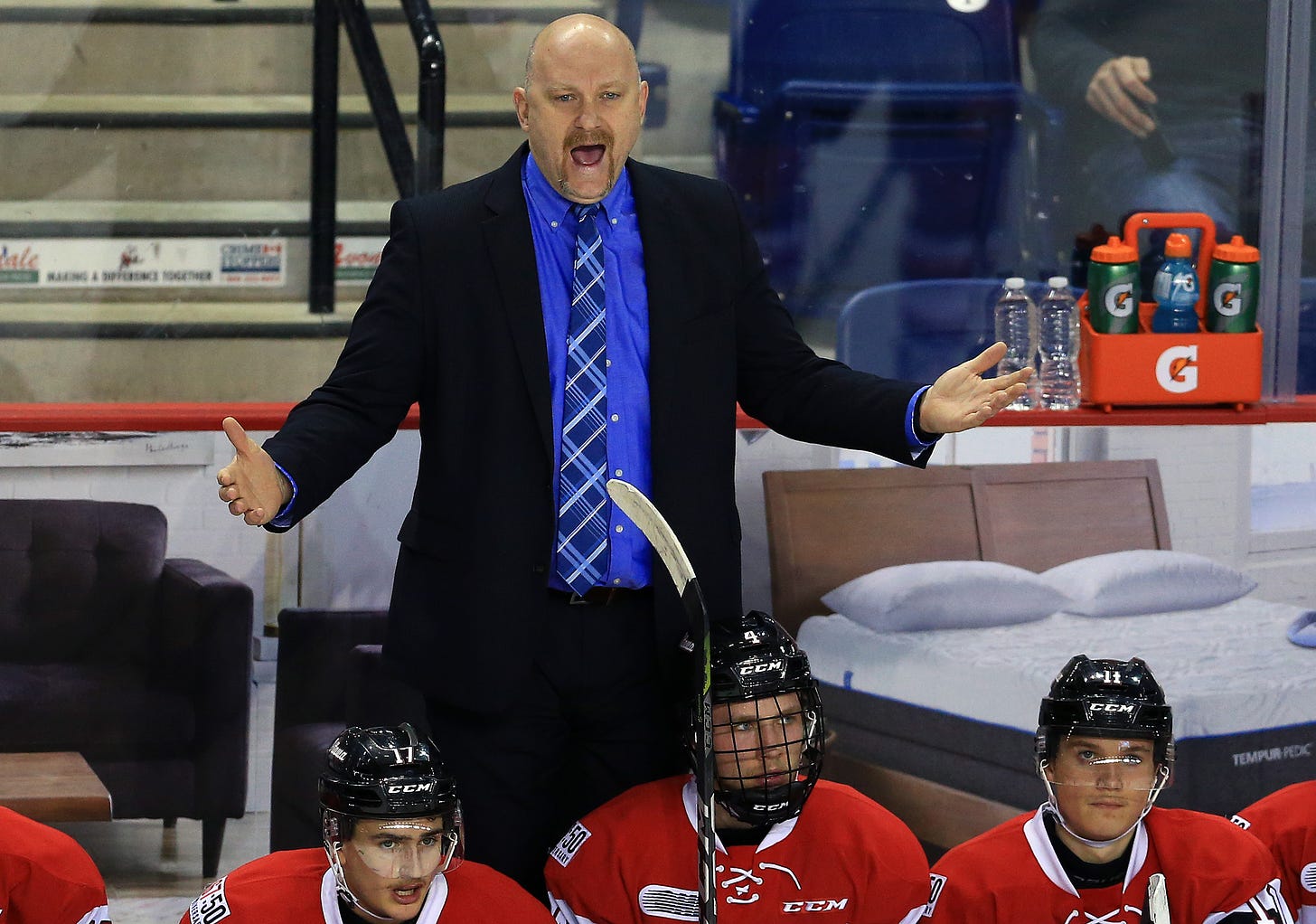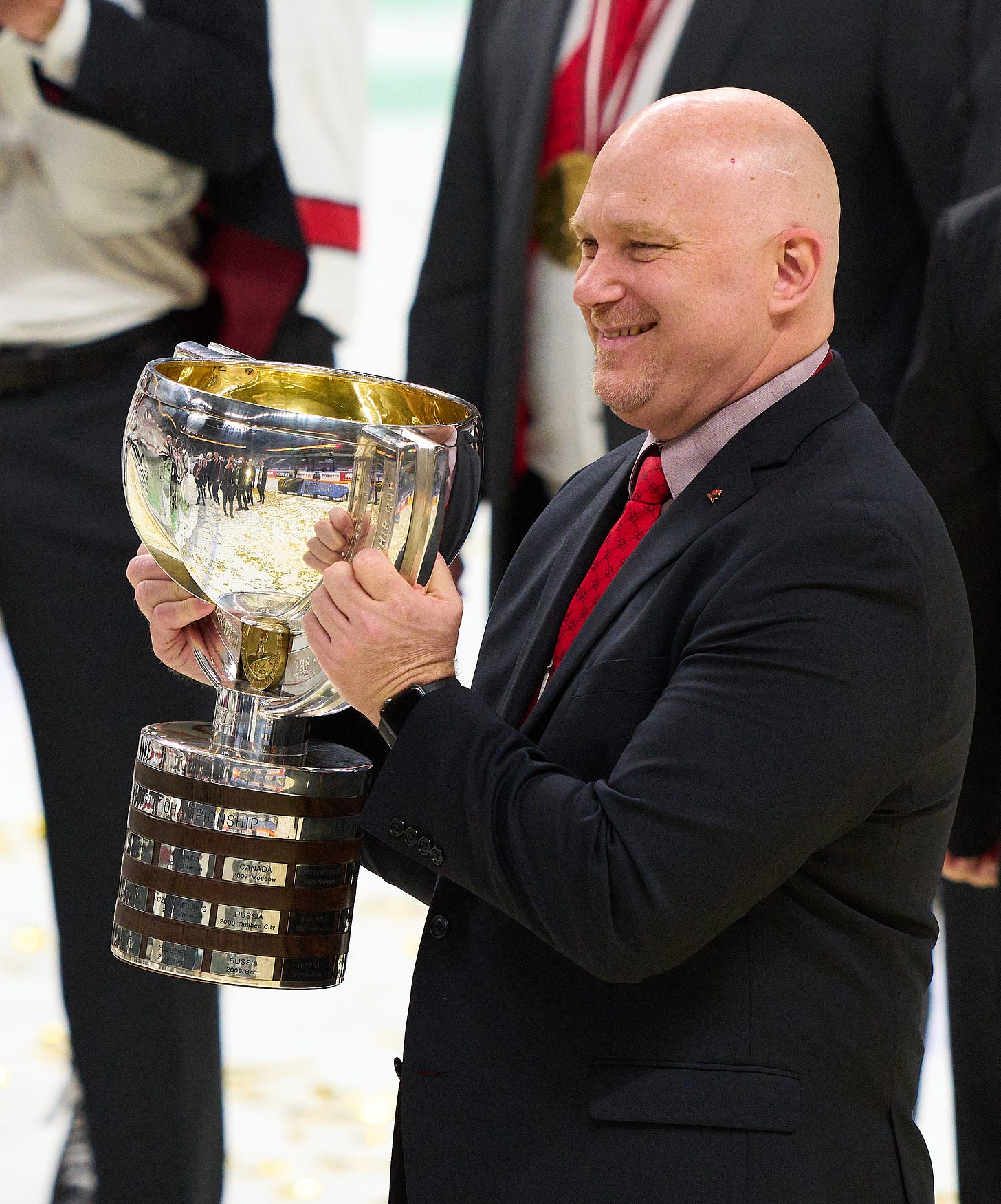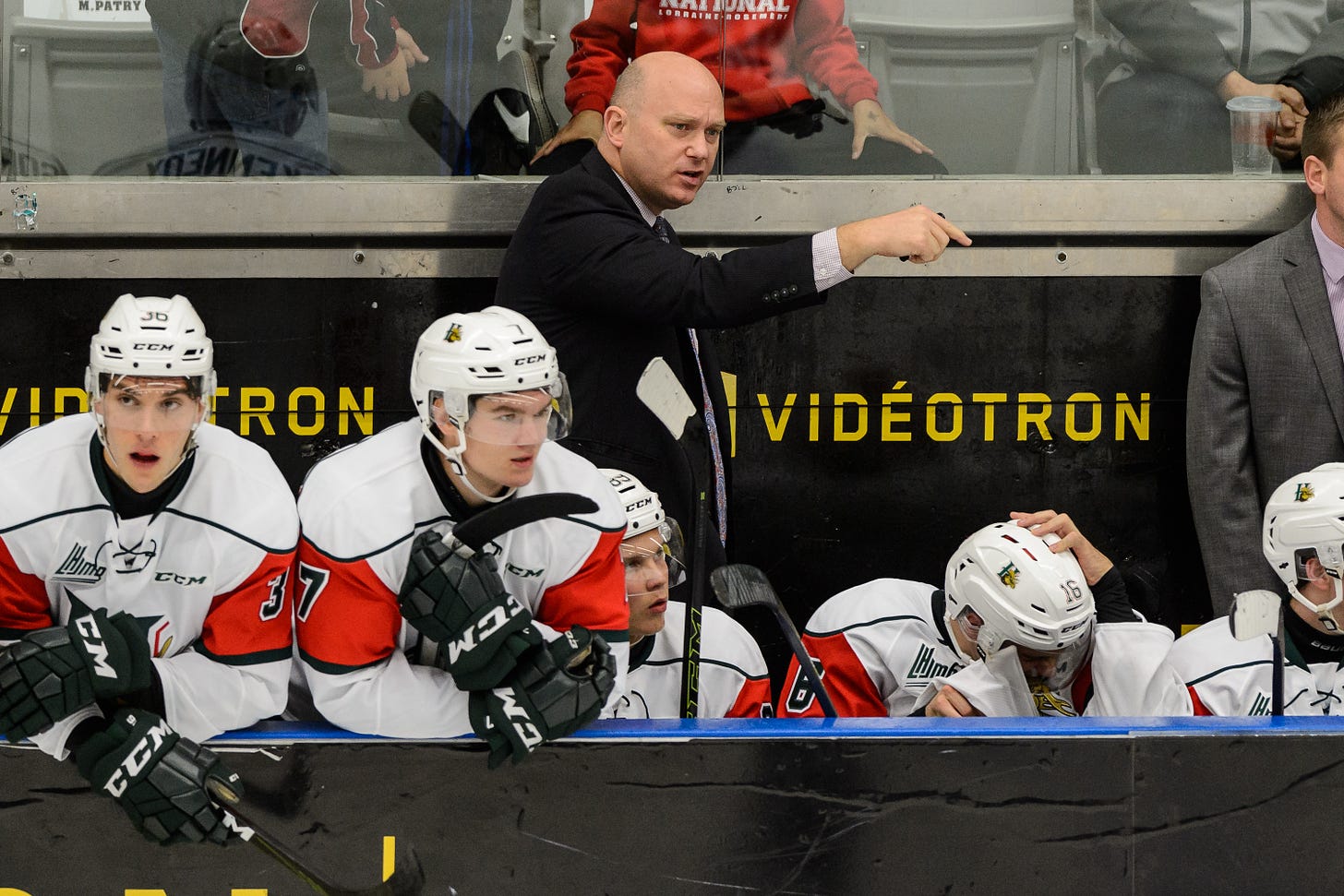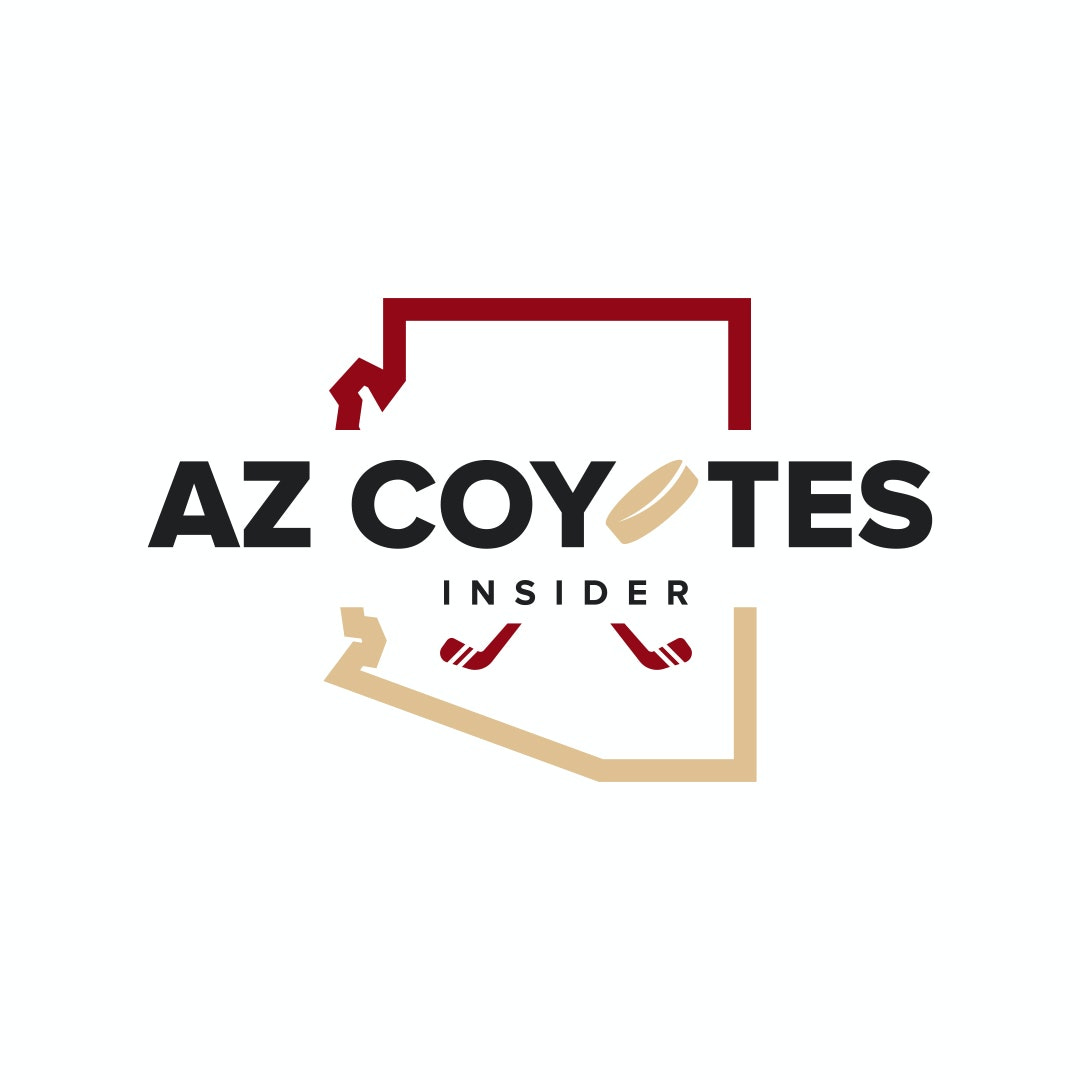Culture builder: Human connection at core of Andre’ Tourigny's coaching philosophy
Longtime QMJHL and Hockey Canada coach brings wealth of experiences to Coyotes
Welcome to the AZ Coyotes Insider newsletter. My plan is to publish stories four to six times per week. By subscribing, you’ll be supporting independent, accountable journalism. Subscribe now so you won’t miss a story.

When Andre’ Tourigny arrived as coach of Rouyn-Noranda in November of 2002, the Huskies had no English speaking players. Not even the GM spoke English. The QMJHL outpost, known as the National Copper Capital, is 96-percent French speaking, and both its location in northwestern Quebec and its language made it difficult to attract outsiders.
Tourigny wanted to change that. It wasn’t that he had a proclivity toward English speaking players. He was born in Nicolet, Quebec, and he didn’t speak English at the time. He just wanted to build the best team possible, and he knew that meant being open to all possibilities; connecting with every type of player.
“The first guy we traded for was an English speaking guy from Halifax named Mike Couch (who finished his career by playing for the Arizona Sundogs in the Central Hockey League),” Tourigny said. “He loved Rouyn.”
So much so that Couch became a recruiting tool for Tourigny.
“Two years later, Mike Couch was playing university hockey in The Maritimes and we traded for a guy in Halifax, Justin Munden, and he didn’t want to report,” Tourigny said. “Without me asking, Mike called me and said, ‘Do you have the number for Justin Munden?’ So I gave it to him.
“Mike’s school (St. Thomas University) was four hours away from Halifax, but Mike jumped in his car and drove to Halifax. He called his dad and his dad went to meet the parents of Justin while Mike talked to Munden and explained how fantastic his experience was in Rouyn. Munden was on a plane the next day. He became captain of our team. He became bi-lingual and he married the most beautiful girl in town and they have three kids. That’s the human connection. That’s how we built our team in Rouyn and that’s how I believe in building any team.”
Those who know The Bear best use a variety of adjectives to describe him. He is a culture builder who believes in one unflinching set of rules for everyone on the team. He is a tactician who has been scheming new ideas, drills and solutions for the game since he was 8 years old. He is a hard worker who learned that particular virtue while growing up on a dairy and chicken farm where his father worked from 5 a.m. until 10 p.m.
The one trait that everyone in Tourigny’s life cites, however, is his ability to connect with people. It’s evident in his nickname, which was earned both because of the size of his hands, and because of the bear hugs he delivers. It’s evident in the trips he takes back to Rouyn every year to see its beautiful lakes and its welcoming citizens. It’s evident in his easy smile and the sense of humor that he displayed in his introductory news conference on Thursday. It’s evident in the way that he coaxes maximum effort out of his players.
“Sometimes, it’s just about honesty,” said former Coyote Alex Tanguay, who played for the Avalanche while Tourigny was an assistant coach there for two seasons. “Not every player in the room is going to like the situation he is in or the ice time he is getting, but when you have that honesty from a coach like Andre’ brings when he tells you, ‘This is what you need to do to get an opportunity,’ players will respect that.
“You always want an honest answer from your coach. It might not be the answer you’re looking for, but if he tries to give you that and then he gives you solutions to grow your game, to help you get better and put you in a situation where you’re going to play more minutes, how can you not respect that guy?”

Coyotes executive Shane Doan didn’t know Tourigny before serving as Canada’s assistant GM at the recent World Championship in Riga, Latvia where Canada won the gold medal. All he knew was that Hockey Canada’s senior vice president of hockey operations, Scott Salmond raved about him. Salmond had signed Tourigny to a one-year contract in March with the intention of putting him behind the bench as the head coach at the 2022 World Junior Championship and 2022 World Championship, while serving as an assistant for the 2021 World Championship and 2022 Olympic Games.
Tourigny, 47, was already on Coyotes GM Bill Armstrong’s radar before the World Championship began, but Doan quickly came to understand why both executives were so interested in bringing Tourigny aboard.
“Watching him handle the D-corps when we started 0-3 at Worlds and then when we were winning at the end was special,” Doan said. “There were a couple players (Braden Schneider and Jacob Bernard-Docker) who didn’t play a lot and he spent more time with those two guys in practice than he did with the guys that were playing a lot.
“His relationship with those two guys was the most impressive thing to me. He really fought for them and believed in them, and I think that’s the only way to lead and keep those guys engaged and feeling important. They ended up playing bigger minutes as we went along. That just showed me that he understood the player’s perspective but he was still willing to make the hard decisions.”
Tourigny admits that he has a strong personality and a strong system of beliefs that guides him. But he has also tried to remain open to the litany of ideas with which he has come in contact after two decades in junior hockey, three seasons as an NHL assistant, and a glut of tournaments behind the bench for Hockey Canada.
“I had been with Hockey Canada four times before going through the NHL,” he said. “Every coach I coached with on those four staffs went through the NHL. There’s no one that did not make it to the NHL.
“What does that mean for me? Really good hockey guys. Really good knowledge. Passionate guys. You learn when you are in that kind of environment.”
Tourigny hopes that he is still as much of a sponge to new ideas as he was when he showed up at Shawinigan 23 years ago as an unpaid assistant working other jobs to make ends meet. But at no time has he stepped more outside of his box than when he decided to soak up English as a second language around 2006 in Rouyn-Noranda.
“My assistant coach (Danny Dupont) was the son of Moose Dupont, who played for the Flyers,” Tourigny said. “He left for a job just a couple games into the season — good for him — but now I’m not speaking English and we had seven English speaking guys on our team. Justin Munden was one of those guys who could speak a little bit of French and he was our captain so I said, ‘What do you want me to do?” He said, ‘I want you to coach in English, too.’ “I said, ‘Mundy, I cannot put a sentence together,’ and he said, ‘Don’t worry. I will help you.’
“You're in front of your players, your leader, your two assistant captains and I thought, ‘Now it's time for me to show that I care about them.’ The very same day, I picked up the phone and called a teacher to take classes three times a week, but what I told Mundy is this: ‘OK, I’ll do it, but if I see one guy laugh while I am talking, you will get your ass kicked in French.’”
They didn’t laugh, and Tourigny eventually added another bullet point to his considerable résumé.
“My English coaching started like this: ‘F1. You. There,’” Tourigny said, laughing. “I could not even make a sentence but the players helped me and I learned. That year, I won coach of the year in the Q and I always joke that it was because they could not understand what I was saying.”

Every NHL coach will tell you that connecting with players and forming a partnership is the only way to coach in today’s NHL. But relationship building doesn't mean a thing if a guy can’t coach from the bench.
Tourigny brings plenty of accolades to suggest that he can. He won his fourth gold medal as a Hockey Canada coach at this year’s World Championship. He was named QMJHL coach of the year in 2006, OHL coach of the year in 2019 and 2020, and CHL coach of the year in 2020.
While Tourigny has not tackled the head-coaching challenge at the NHL level, which is a major step up from the QMJHL or even the world stage, a variety of people believe that he is ready to try.
“He has been in the NHL as an assistant coach and he has learned from some very good people (including Patrick Roy in Colorado and Dave Cameron in Ottawa),” Salmond said. “But beyond that, he has run his own program (in juniors) so when you have done that and then you are able to apply your experience before you get the big opportunity in the NHL, you can work the kinks out. That gives you the opportunity to be ready.”
When the Senators fired Cameron and his staff after the 2015-16 season, Tourigny returned to the QMJHL as head coach of the Halifax Mooseheads. Former Coyotes GM Bobby Smith owns that team, and while Smith only had Tourigny for one season before Tourigny resigned to become the vice president of hockey operations and head coach for the Ottawa 67’s, Smith became a fan.
“I already knew how good he was because he had great success in Rouyn-Noranda and if you want to talk about a disadvantaged market, that’s it,” Smith said. “It’s a mining town in northern Quebec. It’s a sell job to get kids there and yet everybody loved playing there for André. They would get English kids from Halifax who would love it and never want to leave.
“People will tell you he’s a straight shooter, but he was also a great tactical coach who could make adjustments on the fly, and he was always involved in building every aspect of the team. I remember when we were building our practice facility, he wanted to be involved in the choices we made because he understood how all the details of that building were important to the team and its development.”
Tourigny has a voracious appetite for player evaluation. Working the Junior circuit for so long as a coach and GM meant having familiarity with players inside his program, and across Canada.
Grant McCagg has been in the scouting business for the better part of the past two decades. He started with McKeen’s Hockey, helping publish their first draft guide that was mailed to people in 2007. He worked as a scout for the Canadiens, he has worked for TSN, The Hockey News, national writer Bob McKenzie, and he started his own publication, Recrutes, in 2017.
“I contacted André when he was the coach and GM in Rouyn-Noranda more than a decade ago because I figured, the more sources I have for my scouting, the better,” McCagg said. “He didn’t know me from a hole in the ground and yet we must have talked for an hour.
“I don’t know how many hours he spent scouting. It always amazed me how well he knew all the kids from the Quebec league. He knows them going back to midgets. He does his homework and he has a lot of sources across Canada. At this point, he has coached so many U17, U18 and U20 teams that he can give me background on kids from one end of Canada to the other, even though he’s in eastern Canada. That comes from his hard work and the fact that he’s very passionate about it. He lives and breathes hockey.”
Tourigny expects the next 30 days to be “a sprint.” He needs a work visa, he needs a bank account, he needs a place to live, a car, a cell phone, a computer, an email address, and he needs to find some assistant coaches. His priority after meeting the media on Thursday, however, was the same priority that has driven his entire career. He wanted to reach out to all of his players.
It’s the same guy that Armstrong secretly observed 17 years ago in a Rouyn-Noranda restaurant, while working as an amateur scout for the St. Louis Blues.
"I was tucked away in this little cubbyhole, grabbing a bite to eat after the game,” Armstrong said. “I saw this man come in and the entire team from Rouyn was there. He was known as this big, tough coach and I watched him interact with his players for about two hours. I was fascinated with his ability to kind of interact with the young kids and at the same time get the most out of them on the ice.
“When you bring in a (new) coach, he has a lot of power inside your organization. He represents not only your franchise, but also your players because of the culture he's driving and what he's trying to push the players to become. It’s a big hire.
“We had time to dig in and I liked that fact. We weren't under the gun. We could sit there and do as much research and talk to as many people as we want. It was a good process for us as an organization to go through. We were unanimous about our choice.”
Follow Craig Morgan on Twitter: @CraigSMorgan





Is it because you are the one writing this article (absolutely wonderful as usual!!)? or is it the new coach? My hope is growing and growing. Leaning English as a second language as an adult is not easy. He must have a lot of passion for hockey and coaching hockey to overcome this. I can't wait for the next season. Thank you Craig!
He comes across as more than a coach, but not necessarily out of necessity and that the Coyotes can't afford him not to wear multiple hats unlike saying a coaching hire in Toronto. Instead, he's clearly a lifelong learner and it sounds like he could have been competently hired on as something other than a coach, such as a draft analyst or scout. The knowledge he brings on the upcoming generations of players coming out Québec makes me wonder if we'll steer towards there in not so distant drafts to find some hidden gems.